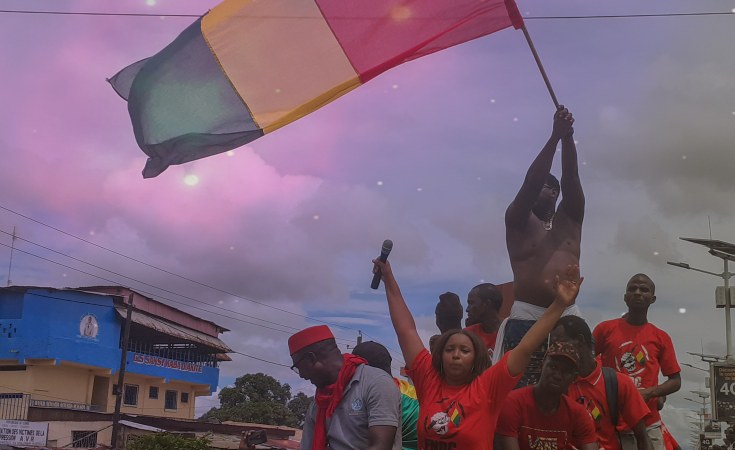Dakar — Guinean authorities should investigate the attacks on five journalists while they covered protests, hold those responsible to account, and ensure the press can work freely and safely while covering civil unrest, the Committee to Protect Journalists said Friday.
In separate incidents on July 7, 27, and 28, demonstrators assaulted and injured at least five journalists covering protests for privately owned media outlets in the capital Conakry, according to a statement by the Guinean Press Professionals' Union (SPPG) and the journalists, who spoke with CPJ via messaging app.
"Guinean authorities must investigate the assault and injury of five journalists covering July protests and hold those responsible accountable to send a clear message that violence against the press is not condoned," said Angela Quintal, CPJ's Africa program coordinator, in New York. "Political actors must protect journalists covering protests and not hinder them from doing their jobs."
The journalists attacked were:
Algassimou Baldé, reporter for television station Djoma Média
Abdallah Camara, editor-in-chief of the television station Evasion Guinée
Mohamed Sangaré, camera operator for Evasion Guinée
Alsény Aye Soumah, reporter for Djoma Média
Mamadou Bhoye Laafa Sow, reporter for Guineematin.com news website
Major protests against Guinea's ruling military junta, which took power in a September 2021 coup, had begun in June and continued in late July, according to news reports.
On July 27, Camara and Sangaré reported on demonstrations in the neighborhoods of Bambeto and Cosa, suburbs of Conakry, when "youths armed with rocks, knives, and scissors" approached the journalists and threatened them by chanting, "You're the ones broadcasting the images. We'll finish with you," Camara told CPJ.
One of the protesters grabbed Camara, pointed a pair of scissors at his neck, and demanded he hand over all his belongings, while another protestor grabbed Sangaré, beat him on his back and neck, and took his cellphone, the journalists told CPJ.
The demonstrators also took Camara's cellphone and the two phones, which were used as reporting tools, were not recovered, the journalists told CPJ, adding that they escaped without significant injury.
Separately on July 27, Sow was broadcasting a protest in Conakry on Guineematin.com's Facebook page when he observed clashes between demonstrators and gendarmerie officers, he told CPJ. Sow said he kept his camera on and moved from the crowd but was confronted by a group of "angry, young demonstrators" who accused him of "exposing them."
The demonstrators kicked and punched him on his back and legs and took his camera, Sow said, adding that he only escaped after a motorcycle taxi driver intervened and pulled him away. Sow did not recover his camera or report it stolen and escaped the incident without severe injury.
Sow said he was broadcasting a protest in a Conakry suburb on July 28 when Guinean military personnel and gendarmerie officers fired tear gas at demonstrators and ordered Sow to leave. Sow stopped reporting and left after soldiers shouted at him to go and accused his outlet of opposing the government.
Separately on July 28, Baldé was filming a protest in Conakry when young members of the National Front for the Defense of Democracy (FNDC)- a coalition of political parties, unions, and civil society groups opposed to the military government-and demonstrators began throwing stones at security forces, Baldé told CPJ. "It was a stampede," Baldé said. "In this hustle and bustle, I was trapped (and) surrounded by teenagers who were barely 18 years old."
Baldé said he pulled out his press badge, and demonstrators began kicking and hitting him with their fists and tried to pull his bag away. Baldé was able to escape and return to his outlet headquarters after a police truck ran through the street to disperse the crowd. "I have been covering demonstrations for eight years, but the one of this day was an indescribable virulence," he added.
Baldé experienced further violence while covering a protest on July 7 with Somuah; demonstrators yelled at them to leave and threw rocks at the journalists while they worked, he told CPJ. Baldé was only able to conduct two interviews.
"I was about to leave the scene when I received a stone to the head," Soumah said. "I fell and passed out." Somuah said he was later treated at a clinic for a head injury.
CPJ calls and messages sent via app to the communication directorate for the National Gendarmerie of Guinea did not receive a reply.
Abdoulaye Oumou Sow, a communications officer for the FNDC and not related to Mamadou Bhoye Laafa Sow, told CPJ via messaging app that he would discuss the alleged attacks with SPPG, adding that when he was a journalist, he recalled being attacked several times by security forces while covering protests. "Often, counter-protestors, under the supervision of the security forces, (will) attack journalists," he said.


